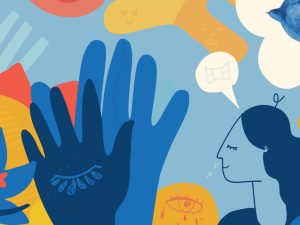How digital technologies may impact eating disorders and mental health.


By Lucy-Paige Willingham, Co-Lead Sprouting Minds Young Person’s Advisory Group and Dr Dasha Nicholls, Clinical Reader in Child Psychiatry, Imperial College London
Social media and body image
Something we hear consistently as a generation in the digital age is "not to believe everything you see online." From filters to photoshop, cosmetic surgeries and false advertisement we are told not to allow any of this to affect us and see through the facade of our screens. However, when suffering from something like an eating disorder or body image issues, it is hard to ignore the damage this might cause.
Thoughts arise like, why can't I look like that? Why isn't this fitness program working for me? I wish I looked like that…
All thoughts that may have a detrimental effect.
"If there is something I have learned as someone who has suffered from an eating disorder is that I was never satisfied with one aspect of myself as I was growing and changing. I would always pick on one thing and overthink it and try to change it; but then I would look back and realise that it was an insecurity in my head and actually realising there was nothing wrong with the way I looked. I have learned that you must accept and love yourself for who you are at every stage of your life because you are constantly growing and it makes us beautiful. My appearance was different at 15, than what it is at 20 and will be different again at 25 and 30. So we must appreciate who we are now in this moment." – anonymous
The impact of tracking apps, calorie counting and diet culture.
One thing that some people may not consider is the impact that dieting, calorie counting and fitness apps may have in individuals suffering with an eating disorder. Despite being a great advancement for those to keep track of their health and wellness, some of these apps become a stressor for compulsive calorie counting and fixation on food.
"During my teenage years I suffered from an eating disorder and didn't even realise it. I was obsessively counting my calories and restricting my food intake without the proper knowledge and maturity to be using an app of this nature. I didn't realise the harm this was doing to my well-being and how much anxiety this would cause me. I would often feel guilty if I exceeded the set goal or hungry when I was meeting it. If I had the correct information and was educated on this, I feel this would have been far more beneficial for me to use an app like this effectively and healthily." – anonymous
It is clear that there are many misconceptions around dieting culture and calorie counting apps as they can often be misconstrued for being "healthy", however without the right education on how to use apps that track your fitness and intake, this could be a catalyst for creating negative habits and impact on mental well-being.
I feel that there needs to be more awareness around eating disorders and potential triggers for negative behaviours and habits to arise. Therefore, people need to be educated on these effects and how to properly look after yourself on a mental and physical level.
Lucy-Paige Willingham, Co-Lead of Sprouting Minds young person's advisory group.
A response to Lucy-Paige's blog from Dr Dasha Nicholls, Clinical Reader in Child Psychiatry, Imperial College London
Lucy-Paige's blog raises many issues that will resonate with young people about the impact that social media can have on people with, or at risk of, eating disorders. We know from research that perfectionism is a trait that mediates the relationship between eating disorder psychopathology and online risk, especially for people at higher weight [1], and that the number of social media sites visited predicts body dissatisfaction, general negative affect, sadness, and guilt [2]. We also know some of the mechanisms through which social media can exert harms, namely as a forum for online bullying, including social exclusion, and by displacing sleep and exercise, both of which are vital for mental as well as physical health [3]. We found that online platforms, when used as a vehicle for cyberbullying, can result in psychological trauma [4], and that the anonymity social media affords can mean that even young people without aggressive personality traits can become perpetrators of cyberbullying [5]. Parenting practices seem to be more relevant in cyberbullying than traditional bullying and effective parenting practices such as positive parenting and monitoring of social media can protect against cyberbullying involvement [6].
Yet despite concerns about the role that social media might play in perpetrating harms for mental health, we also know that such platforms enable the social connections so vital for positive mental health [7], and that without these connections, isolation can fuel eating disorders. A particular challenge for people with or at risk of eating disorders, and heightened during the social isolation of the pandemic, is the number of dieting, calorie counting and fitness apps being promoted, with algorithms that rapidly amplify any engagement. Work is underway to explore whether social media influencers' delivery of micro-interventions to promote positive body image [8] can begin to reverse this trend – a small but potentially important step towards a public health approach to eating disorders prevention.
1. Prnjak K, Jukic I, Korajlija AL. How Perfectionism and Eating Disorder Symptoms Contribute to Searching Weight-Loss Information on the Internet? Medicina (Kaunas) 2019;55(10) doi: 10.3390/medicina55100621 [published Online First: 20190923]
2. Bennett BL, Whisenhunt BL, Hudson DL, et al. Examining the impact of social media on mood and body dissatisfaction using ecological momentary assessment. J Am Coll Health 2020;68(5):502-08. doi: 10.1080/07448481.2019.1583236 [published Online First: 20190325]
3. Viner RM, Gireesh A, Stiglic N, et al. Roles of cyberbullying, sleep, and physical activity in mediating the effects of social media use on mental health and wellbeing among young people in England: a secondary analysis of longitudinal data. Lancet Child Adolesc Health 2019;3(10):685-96. doi: 10.1016/S2352-4642(19)30186-5 [published Online First: 20190813]
4. Mateu A, Pascual-Sanchez A, Martinez-Herves M, et al. Cyberbullying and post-traumatic stress symptoms in UK adolescents. Arch Dis Child 2020;105(10):951-56. doi: 10.1136/archdischild-2019-318716 [published Online First: 20200623]
5. Pascual-Sanchez A, Hickey N, Mateu A, et al. Personality traits and self-esteem in traditional bullying and cyberbullying. Personality and Individual Differences 2021;177:110809. doi: https://doi.org/10.1016/j.paid.2021.110809
6. Pascual-Sanchez A, Mateu A, Martinez-Herves M, et al. How are parenting practices associated with bullying in adolescents? A cross-sectional study. Child Adolesc Ment Health 2022;27(3):223-31. doi: 10.1111/camh.12475 [published Online First: 20210531]
7. Dewa LH, Lawrance E, Roberts L, et al. Quality Social Connection as an Active Ingredient in Digital Interventions for Young People With Depression and Anxiety: Systematic Scoping Review and Meta-analysis. J Med Internet Res 2021;23(12):e26584. doi: 10.2196/26584 [published Online First: 20211217]
8. Atkinson MJ, Diedrichs PC. Examining the efficacy of video-based microinterventions for improving risk and protective factors for disordered eating among young adult women. Int J Eat Disord 2021;54(5):708-20. doi: 10.1002/eat.23460 [published Online First: 20210107]
About the authors
Lucy-Paige Willingham is co-lead of Sprouting Minds which is supported by the UKRI Digital Youth Programme. This blog expresses the personal views and lived experience of Lucy-Paige Willingham, and does not represent the opinion of Sprouting Minds or the UKRI Digital Youth Programme. If you were affected by this blog and would like to seek advice and support around issues it raised you can contact the following links:
https://www.youngminds.org.uk/
A film on eating disorders in men and boys
Dr Dasha Nicholls is Clinical Reader in Child Psychiatry, Imperial College London and leads the Child and Adolescent Mental Health research team in the Division of Psychiatry, of which she is also Deputy Head. She also leads Multimorbidity and Mental Health for the North West London Applied Research Collaboration (ARC). Their research aims to improve understanding and interventions for children and young people (CYP) with feeding and eating disorders and those living at higher weight, as well as a broader focus on young people's mental health through population health research.


